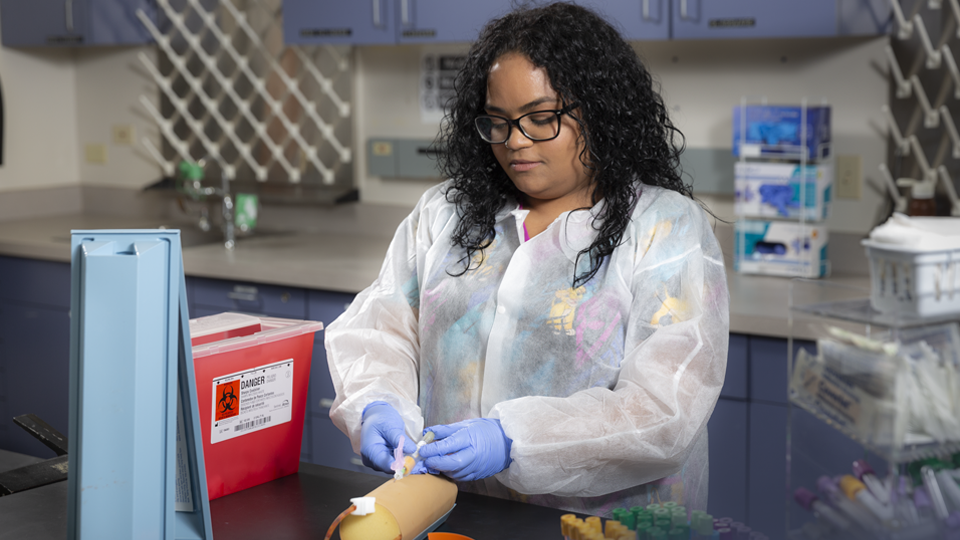
Student Rosy Jimenez at Downtown Milwaukee Campus
When Victor Santiago-Avila arrived in the United States from Mexico in 2003, he struggled to learn English but managed to complete high school. Then he began classes at MATC, until family problems forced him to leave the college.
As a Mexican immigrant with only a high school diploma, Santiago-Avila realized it would be difficult to achieve the strong future he desired.
“No one expected me to have a career in anything,” he said. “I was told there really weren’t any options except to go find a job.”
So he worked: at a factory, for a cleaning service, at McDonald’s, in construction and as a plumbing apprentice. When the COVID-19 pandemic hit, he was laid off.
Santiago-Avila, 33, decided to return to MATC and enroll in business management courses.
JobUp Milwaukee: A cooperative work-education program
While a student, Santiago-Avila heard about MATC’s JobUp Milwaukee pilot project. This cooperative education approach connects employers seeking job candidates with MATC students interested in paid, on-the-job training in their field of study.
In January 2021, he became a patient service representative at Aurora West Allis Medical Center, a position offered through the JobUp program.
Santiago-Avila worked full time at Aurora while taking classes at night and online. He graduated with an associate degree in December 2021 and has since been promoted to a Level II patient service representative and is also training new employees.
“I feel like I didn’t really start college until I was 31,” Santiago-Avila said. “It took me long enough to get here, but I am finally here.”
He plans to pursue a bachelor’s degree in healthcare sciences while continuing to work for Aurora, and one day hopes to earn a master’s degree in health administration.
“I never expected to work in healthcare, but so far it has been great,” Santiago-Avila said. “I feel like I’m on the right path for me, and thanks to MATC I was able to find that path.”
That’s exactly the aim of JobUp Milwaukee, which received funding to pilot the cooperative education approach from JPMorgan Chase, Bader Philanthropies and Greater Milwaukee Foundation, said Laura Bray, MATC’s vice president for college advancement and external communications. Bray added that the greatest success so far has been implementing this model within healthcare fields.
It's a real win-win. Employers get workers now. Students get paid to work in their areas of study.
Impact of JobUp Milwaukee: Employers
“Workforce shortages and the skills gap are negatively impacting our local economy,” Bray said. “Cooperative education can provide employers with the workers with the essential skills and vital talents needed right now, with ongoing training for the student employee to advance into higher skilled positions.”
Courtney Kelly, MATC’s coordinator of the JobUp Milwaukee program, noted that employers in the program build their talent pipeline, increase productivity, evaluate prospective employees under real working conditions and reduce recruitment and training costs.
“It’s a real win-win,” Kelly said. “Employers get workers now. Students get paid to work in their areas of study.”
Impact of JobUp Milwaukee: Students
Gaining on-the-job experience in their field of study and receiving a paycheck are key perks for the students. The workplace opportunities also help the participants enhance their résumés, expand their professional network and gain valuable insight into their career pathways.
“The goal is to provide learning through jobs and academics,” Kelly said. “These are paid positions. Our students, who are mostly nontraditional, usually need to work. Now they do not have to decide — should I work or attend school? They can do both and build time of service with a company in their field.”
Bray said MATC often sees students delay or even stop their education to pursue jobs that pay well. But by not completing their degrees, those students can lose opportunities for longer-term wage growth and career advancement.
Santiago-Avila knows that all too well. But thanks to JobUp Milwaukee and other MATC resources, he is heading in a good direction and urges others to follow his path.
“It might seem like every door is closed. But if you keep at it,” he said, “you’ll find that there are doors that open.”
Employers, to get connected with MATC students, email careerhub@matc.edu or visit matc.edu/careerhub.

